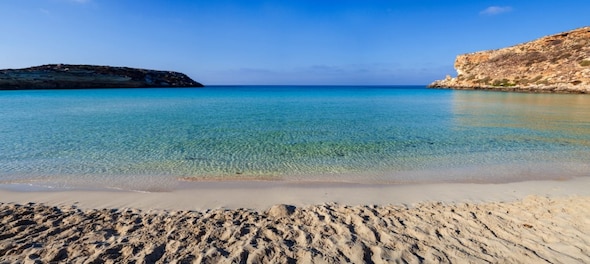
“Water, water everywhere. But not a drop to drink”.
This adage gets scarier by the day. Our oceans are under severe threat by human activities, especially when the economic gains come at the cost of maintaining environmental sanctity and balance deigned by Nature. Around the world, the marine activities have brought in pollution, ocean warming, eutrophication, acidification and fishery collapse.
Blue economy relates to presentation, exploitation and regeneration of the marine environment. It is used to describe sustainability-based approach to coastal resources, ranging from fisheries, aquaculture to maritime issues, coastal issues and maritime tourism. As a topic, it affects all the nations and global communities (including the non-ocean facing residents, who say; “I am a vegetarian. And I don’t live near any ocean or sea. I don’t need to understand marine life ”.
Also Read: Twenty years in the making — Where is India’s National Plan of Action for shark fisheries?
Oceans are increasingly a source of food, energy, medicines and enzymes. Oceans and seas cover over two-thirds of Earth’s surface, create sustainable livelihoods and work, provide food and minerals, generate oxygen, absorb greenhouse gases and mitigate the impacts of climate change, determine weather patterns and temperatures, and serve as global trade facilitator.
80 per cent of world trade uses the seas, 40 per cent of the world’s population live near coastal areas, and more than 3 billion people need the oceans for their livelihood. The Ocean trade value including the food security it offers, is estimated to be over US$ 25 trillion, with the annual value of produced goods and services estimated to be US $2.5 trillion per year ( ~ world’s 7th largest economy in gross domestic product ).
Oceans - The newer global crisis
The UN Sustainable Development Goals 14 - “Conserve and sustainably use the oceans, seas and marine resources” - would need tremendous human efforts, global cooperation through various legal and institutional frameworks. To this effect, Blue economy finance deals with the demand for, and supply of financial capital for investing in ocean-related economic activities and governance. Currently options of affordable long-term financing at scale for Blue economy is nearly zero. Ensuring ocean health will require financial investments, and will need focused financial instruments, like blue bonds,insurance and debt-for-adaptation-swaps. Integrating sustainable blue-criteria into mainstream financing principles would need collaboration with global finance sector.
For the ocean economy to be sustainable, financing has to be affordable, committed to sustainable use and governance of the ocean. This includes financial instruments that are deployable across : local, national, and international. These instruments could be offered or used by individuals, public and private companies, governments, and other institutions. Companies could use equity or debt lines, to finance development of more sustainable products, technology, and also to gain access to new sustainability friendly-markets. Governments may need to finance their blue economy projects for implementing conservation policies or investing in developing an enabling environment for the private sector to finance and insure sustainable ocean economic activities. At times, the governments could also use such a financing as a refinancing tool to help build blue economy businesses in their country.
Challenges in financing
Sufficient awareness and urgent concerns around Blue Economy are still missing. Even nations affected by it don’t have sufficient granular data that can satisfy the process & compliance needs of the financing institutions. Even in cases where ocean finance data are available, they are often too aggregated within the national budgets. The current lack of a globally accepted blue economy taxonomy means that different stakeholders interpret the cause and effects differently. Hence we see lesser policy debate, lack of development policies, and techno-legal challenges for global financiers.
Paying for access, management, upkeep of oceans seems to be a difficult topic to comprehend. After all, it’s just water, ain’t it ? The users of the oceans, including those who benefit from it and those who damage it by their current actions, do not adequately pay for it. Nations should agree in how to charge for such a usage. One also has to derisk the ecosystem that’s seen as impacting ocean based sustainable development. For example, usage of marine insurance as a strategy for managing commercial risks for shipping, aquaculture, fishing, and other offshore industrial activities is acceptable by financing institutions. But such insurance is neither common nor affordable in many parts of the world, as well as to SMBs.
Many maritime economies benefit from the ocean economy and generate sizeable economic wealth and assets from it. The financial instructions need to look at these aspects in developing financing blue economy against those revenue accruals. In order to achieve this, national regulations, international maritime laws, multilateral rules and local regulatory environment have to factor in the Blue economy. They have to develop policies that can encourage the transition to a commercially viable or affordable model. Current blue economy status don’t incentivise social enterprise and newer forms of capital for cleaner oceans.
Current financing conditions are just not attractive enough to encourage investors and financiers to invest sustainably in the ocean economy. But the world cannot afford to bleed blue. This crisis deadlock could be the worst Catch-22 the world has seen. Hope the Indian presidency of G20 can bring this critical topic to global debate.
— The authors, Srinath Sridharan, is a Writer, Policy Researcher & Corporate Advisor, and Dr. Nilanjan Ghosh is a Director at the Observer Research Foundation. The views expressed are personal.
Read his previous articles here
(Edited by : C H Unnikrishnan)
First Published: Mar 9, 2023 11:48 AM IST
Check out our in-depth Market Coverage, Business News & get real-time Stock Market Updates on CNBC-TV18. Also, Watch our channels CNBC-TV18, CNBC Awaaz and CNBC Bajar Live on-the-go!


Lok Sabha elections 2024: Pallavi Dempo, Jyotiraditya Scindia among richest candidates in third phase
May 2, 2024 2:50 PM
Bengali star Dev files nomination, promises to plant trees equal to number of votes he gets
May 2, 2024 2:27 PM

